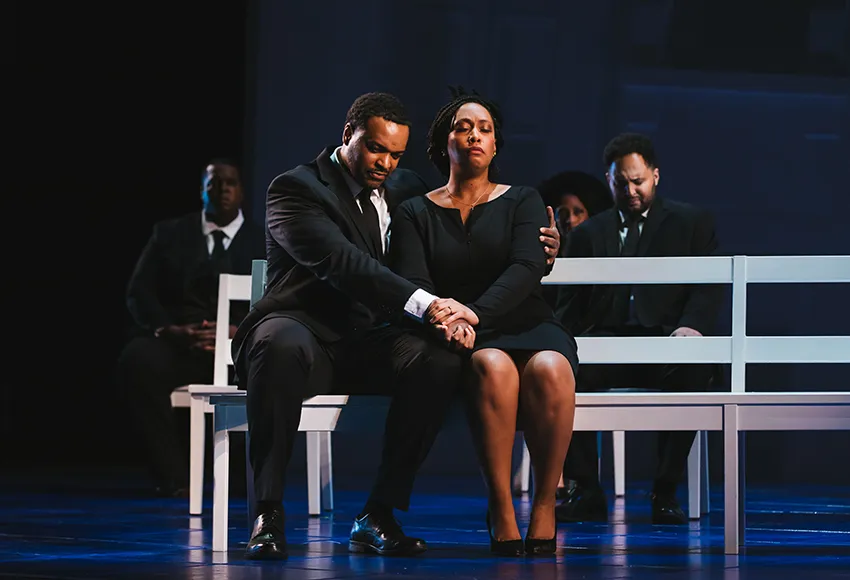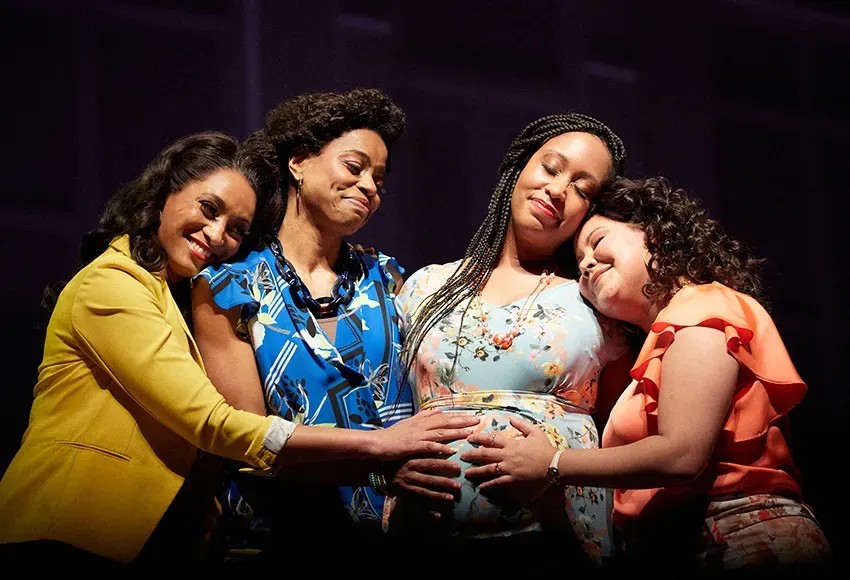Blue
Music by Jeanine Tesori
Libretto and stage direction by Tazewell Thompson
Seattle Opera at McCaw Hall
February 26 and 27, 2022
The biggest challenge for a new opera comes after its premiere production. Will it be picked up by other opera companies and become part of the standard repertoire, or will it die after its initial outing?
Blue, which premiered at Glimmerglass Festival in 2019 and was named Best New Opera by the Music Critics Association of North America, was slated for productions at the Washington National Opera and Lyric Opera of Chicago when COVID-19 forced cancelations.
But as soon as vaccines made it possible for opera companies to offer in-person performances again, this exciting, moving work was presented by the Michigan Opera Theatre, and now by the Seattle Opera, and the Washington National Opera has rescheduled its production for the coming season.
Blue's story is torn from the headlines: a Black police officer and his wife (who owns a soul food restaurant in Harlem) greet their newborn son with joy; the son becomes a rebellious, politically involved teenager at war with his father; the son is killed by a cop at a peaceful protest; the couple and their community grieve his loss and struggle to find a way forward.
The Seattle Opera production, stage-directed by librettist Tazewell Thompson, is aptly spare, with little visual distraction from the feelings and interactions of the characters. The sets designed by Donald Eastman are simple and effective, the costumes designed by Jessican Jahn are colorful and appropriate, and lighting the designed by Robert Wierzel and Eric Norbury creates the perfect mood for each scene.
Most Seattle Opera productions have two casts, to give singers a chance to rest their voices between performances. This production has only one. Jeanine Tesori's music is difficult to sing, and the drama is emotionally intense, so the excellent performances on both Saturday evening and Sunday afternoon of opening weekend were particularly impressive.
Mezzo-soprano Briana Hunter as The Mother, bass Kenneth Kellogg as The Father, and tenor Joshua Stewart as The Son all sang and acted superbly, as did the small group who portrayed their friends and community members. Soprano Ariana Wehr as The Nurse/Girlfriend 1 and tenor Camron Gray as Policeman 1/Congregant 1 were especially memorable. Wehr's hilarious performance as a manic maternity ward nurse was spot-on and provided some needed comic relief. The ensemble singing, especially in the Act 2 funeral scene, was glorious.

One of the most moving moments was The Father's solo during the funeral, a sort of mad scene in which he speeds through all the instructions he gave The Son to try to keep him safe: "Don't wear a hoodie. Don't walk. Run. Don't run. Walk. Don't walk. Don't carry shiny objects. Don't make sudden movements. Don't shave your head. Don't have an Afro. The hoodie. The hoodie. Don't wear a hoodie..."
The drama is so arresting that you might need to attend more than one performance to notice Tesori's beautiful, complex score. The music, expertly played by members of Seattle Symphony under the direction of conductor Viswa Subbaraman, features unusual harmonies and a wide variety of percussion. There are echoes of Ellington, Gershwin, Bernstein, and even Wagner, but the sound is distinctive and original. The most tuneful music occurs in the funeral scene, with songs that sound like traditional spirituals but were composed by Tesori: "I lay my burden down, I ain't going to study war no more," and "Somebody, somebody, O Lord, must come forth." It is the perfect match to Thompson's colloquial and clever libretto. As far as we know, this is the first opera to include the words "Damn, girl!" and to mention collards and chitlins. It's about time.
After the opening night performance, the audience was invited to come into the front seats to hear Thompson talk about the origins of Blue, his collaboration with Tesori, and his own journey into the opera world via his "four mothers" (Dominican nuns) who raised him in a foster home in Blauvelt, New York. Though born and raised in Harlem, where he lived until the age of eight, Thompson lived with the sisters for ten years after his birth family could no longer care for him.
One of the sisters loved opera and played excerpts for the children twice a week. Thompson loved their stories and was nurtured by the sisters to pursue his interests. So it's no surprise that he grew up to be a librettist, actor, director, and playwright. The list of his credits is long, including his selection, in 2020, as the director of opera studies at the prestigious Manhattan School of Music.
Thompson's background also explains the deeply religious element in Blue. When The Son is murdered by a fellow policeman, The Father goes to The Reverend – performed with passionate commitment by baritone Gordon Hawkins – to ask forgiveness "for what I am about to do." He shows the priest a gun he intends to use to kill the man who killed his son.
The audience is then confronted with the problem that confronts us all: how to respond to a profound injustice, and how to manage one's justifiable rage. Thompson's libretto faces this problem head-on, as The Reverend makes the case for restraint in the face of evil: "You must not become evil to justify your evil." Though The Father rejects The Reverend's prayer that God will "redeem the hours wept clean from lost loves and lost lives," he nevertheless leaves the gun on The Reverend's table as he exits.
In his post-performance talk, Thompson said that he is a Christian, a Roman Catholic, and someone who believes every word of his libretto. In this secular world, it's a brave writer who will declare so clearly his belief in forgiveness in the face of disaster and injustice. He takes the side of humanity over its many subsets – race, gender, nationality, politics, guilt, innocence – and makes a case for the peace that "passes all understanding," that begins in the hearts of those who suffer the most.
It's not a popular argument for our times – as Russia invades Ukraine, as blue and red states struggle over the definition of freedom, as millions die of COVID-19, and as LGBTQ+ people, BIPOC, and women continue to seek equality – but it's a powerful argument nonetheless. Audiences stood up and cheered at the end of Blue. For a moment, we could see hope in suffering, and hopefulness in an opera that tells the truth from lived experience.
Blue is at McCall Hall through March 12. For more information and to order tickets, go to seattleopera.org.


